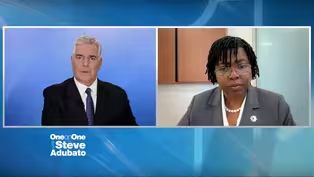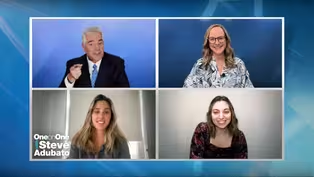One-on-One
Creating a community care model for student mental health
Clip: Season 2025 Episode 2827 | 9m 19sVideo has Closed Captions
Creating a community care model for student mental health
Steve Adubato and One-on-One Correspondent Mary Gamba talk with Monica Burnette, Vice President of Student Services at Seton Hall University, about student mental health and the importance of a community care model where students, faculty, and staff work together.
Problems playing video? | Closed Captioning Feedback
Problems playing video? | Closed Captioning Feedback
One-on-One is a local public television program presented by NJ PBS
One-on-One
Creating a community care model for student mental health
Clip: Season 2025 Episode 2827 | 9m 19sVideo has Closed Captions
Steve Adubato and One-on-One Correspondent Mary Gamba talk with Monica Burnette, Vice President of Student Services at Seton Hall University, about student mental health and the importance of a community care model where students, faculty, and staff work together.
Problems playing video? | Closed Captioning Feedback
How to Watch One-on-One
One-on-One is available to stream on pbs.org and the free PBS App, available on iPhone, Apple TV, Android TV, Android smartphones, Amazon Fire TV, Amazon Fire Tablet, Roku, Samsung Smart TV, and Vizio.
Providing Support for PBS.org
Learn Moreabout PBS online sponsorship(upbeat music) - Recently, my colleague, Mary Gamba and I, on our series, "Lessons in Leadership," had the chance to sit down with a leader in higher ed.
She's Monica Burnette, Vice President Student Services at Seton Hall University to talk about mental health, mental health in college students, the stress, the anxiety, the pressures they feel, and what we need to do to first, acknowledge it, and second, deal with it.
An important conversation.
- Good to see you, Monica.
- Good to see you too.
Thank you for having me.
- It's a pleasure having you.
Let's jump right into this.
College student mental health, an epidemic?
- Well, unfortunately, nationally, Steve, there has been a growing trend of college students who are really showing higher levels of anxiety and depression and stress than in previous years.
We're also seeing across college campuses a higher demand for mental health support, including increased utilization and really need to offer more robust services.
- Along those lines, before Mary jumps in, Mary has one student and one son in college.
- Right.
- One who recently left college to be gainfully employed.
- Graduated, didn't just leave.
- Congratulations.
(hosts laughing) - Adding that graduated.
- Yeah, thank you.
- He left and is no longer- - And we have two in college right now.
So here's the thing I keep thinking about, and you can help all of us, Monica, with this.
- Sure.
- College student mental health, for those of us who are parents, affects our mental health, does it not?
- Absolutely.
I think it can be contributed to several factors.
You know, I think that post-pandemic impacts, you know, students are feeling more isolated, more lonely.
We're seeing, especially in the K-12 sector, some significant academic learning gaps.
And we know our college students are using more social media and technology, and then there's also financial stress with the rising cost of education, right?
So I think that there's several factors, and this impacts not only students, but also their parents too, who are also dealing with this.
- As Mary jumps in, the website for Seton Hall will be up, go and check out Student Services there and a whole range of activities going on at the university.
Mary, please.
- Absolutely.
One of those services, Great Minds Dare to Care.
I know I was speaking with your team, Laurie Pine and Matt, thank you so much for prepping us for today.
But it's really tied to Seton Hall's What Great Minds Can Do.
Can you talk a little bit about that and what exactly is a Great Minds Dare to Care program?
- Absolutely.
You know, one of the things that we really focus on at Seton Hall is care for the community.
And that is really big here.
And we've been fortunate to not only look at best practices with our counseling and psychological services program, but also to collaborate with external partners too.
So the good news is the state of New Jersey has really been at the forefront of this mental health crisis for our students, and they've recognized the need to assist colleges and have generously provided grant funding for our Great Minds Dare to Care program.
And what that is, is it allows us to provide all of our community members with opportunities to engage in things like training and resources and activities that really promote tools and strategies for managing mental health and helping others.
So it's really a community-wide effort.
So not just students being trained, but also faculty and staff members as well.
It really takes a village.
- Monica, I'm gonna follow up on that.
Great question, Mary, but I wanna jump on this.
Has the crisis in mental health for young people, particularly college-age students, has it changed the role of universities in the lives of those students?
Has it really changed what the university needs to be?
- I definitely think that it does.
I think the expectations that college students have of what they're going to experience at university has changed.
And I think institutions have to move forward with innovative ideas and not just the status quo.
We have to keep evolving.
Every new cohort of students presents different challenges.
And I think that as the mental health crisis continues, we really do need to be able to partner and collaborate with other institutions, with our state and legislators as well, just to be able to compliment this problem.
- Mary?
- I would love to hear your opinion, as a parent, Steve and I talk about this a lot as well, for parents that are out there watching that feel, I often feel so helpless.
I feel like I'm saying the wrong thing, doing the wrong thing.
I say, yeah, exactly.
"I can get you set up with a therapist."
"Well, I don't need a therapist."
"Well, what do you need?
Because you're not listening to me."
What advice do you- - And why aren't you opening up telling me these things?
Why do I have to ask you a million questions to find?
No, I'm sorry, go ahead.
- That's all right.
That's all right.
And there's so many parents that are out there struggling and I thought it was a struggle when the kids were younger, but now, once they are in college and even after they graduate college, what advice do you have for parents on truly how to support their kids in this challenging time?
- That's a great question, Mary.
And we speak with our parents often about this challenge.
And I think the very first thing to do is to really normalize the struggle.
You know, I think that once we share with our college students that this is normal, you know, college is going to be difficult but there are resources available on college campuses to help you.
I think that the key thing is to make sure that the students know that they're supported, that there are campus resources there to help them every step of the way.
It's really up to them to really kind of seek those resources as well.
And we do a lot of focus with our students on resiliency coping, really helping them to understand how to build confidence, how to make connections, how to build a support network, how to support and set goals, and also really prioritizing self-care.
That's really important for us too.
Really helping them to understand the growth mindset versus a fixed mindset, if you will.
- I'm gonna follow up on this, Monica.
To what degree is the challenge, not the challenges, but the challenges around mental health for college-age students a product of those students feeling they're the only one?
"I'm the only one".
- Absolutely.
If they feel alone in this, I think that it makes it harder for them to seek help early and often.
But what we're finding is that 40% of students say that their college experience, in their college experience, that they are managing various levels of stress.
- 40%?
- 40%.
- I'm sorry for interrupting, do they connect stress with anxiety?
- That's right.
- Bordering on depression?
- Not necessarily depression, but anxiety for sure.
Anxiety and stress.
So they're saying that mental health is impacting their academic achievement, for example.
- What about academic achievement, I'm sorry, but what about the challenge around achieving academically creating additional stress?
- That's right.
And they're all connected, right?
When your mental health is not at its peak, it impacts everything else.
So I think that, you know, one of the things that we really try to do is to create a community of care where students don't feel like they're alone.
At Seton Hall, we have what we call peer advisors here on campus.
And they're linked to every first year student, and that is their first friend on campus.
That's who they can go to if they have questions about what do I do if if I'm struggling in a course, how do I talk with a professor?
So just making sure that they know that they're not alone is a really big part of helping them to handle the stress.
- Monica Burnette is Vice President of Student Services at Seton Hall University.
To disclose, Seton Hall, a longtime higher ed partner of ours.
Monica, for the work that you and your colleagues do every day for our college-age students, thank you very much, we appreciate it.
- Thank you so much for having me.
- You got it.
Stay with us, we'll be right back.
- [Narrator] One-On-One with Steve Adubato is a production of the Caucus Educational Corporation.
New Jersey Sharing Network.
The North Ward Center.
United Airlines.
IBEW Local 102.
Valley Bank.
Robert Wood Johnson Foundation.
NJ Best, New Jersey’s five-two-nine college savings plan.
PSE&G.
And by EJI, Excellence in Medicine Awards.
Promotional support provided by ROI-NJ.
The New Jersey Business & Industry Association.
- If you register as an organ donor, you have the potential of saving up to eight lives.
- My neighbor passed away.
His eyes were actually donated and that person now can see.
- Not only can you save a life, but if something should happen to me and I'm no longer here, I know that in some small part I'll live on in someone else.
- Say yes, save lives.
- Say yes, save lives.
- Say yes, save lives.
- Be an organ and tissue donor.
Analyzing human trafficking and vaccine awareness
Video has Closed Captions
Clip: S2025 Ep2827 | 8m 38s | Analyzing human trafficking and vaccine awareness (8m 38s)
Onboarding and learning in a remote work environment
Video has Closed Captions
Clip: S2025 Ep2827 | 10m 30s | Onboarding and learning in a remote work environment (10m 30s)
Providing Support for PBS.org
Learn Moreabout PBS online sponsorship
- News and Public Affairs

Top journalists deliver compelling original analysis of the hour's headlines.

- News and Public Affairs

FRONTLINE is investigative journalism that questions, explains and changes our world.












Support for PBS provided by:
One-on-One is a local public television program presented by NJ PBS

